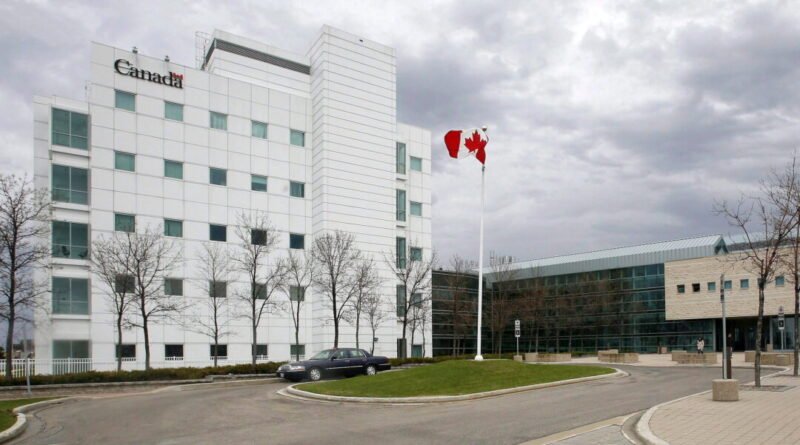Chinese Military Considers Winnipeg Lab a ‘Base’ for Advancing Virus Research
The Chinese military viewed Canada’s top bio-safety laboratory, along with one of its scientists who was later dismissed for security violations, as crucial assets for advancing its virus research, according to government records.
Canadian scientist Qiu Xiangguo, who previously worked at the National Microbiology Laboratory (NML) in Winnipeg, played a role in helping China establish its program on lethal pathogens at the Wuhan Institute of Virology (WIV) before it obtained a top-level safety certification. Following certification, Ms. Qiu facilitated the transportation of dangerous viruses to the WIV.
Ms. Qiu began collaborating with China several years before the shipment by sending Ebola and Nipah virus strains to the WIV in 2019 with government approval.
This collaboration was highlighted in an award nomination by a high-ranking Chinese general in 2016, commending her utilization of the Winnipeg lab to serve Beijing’s interests.
These details are disclosed in recently revealed documents by the Liberal government, examining security investigations at the NML related to Ms. Qiu and her husband, Cheng Keding.
Ms. Qiu and Mr. Cheng were dismissed from the NML in 2019 following security evaluations and were eventually terminated in 2021.
Ties to Chinese Regime
Investigations commissioned by the Public Health Agency of Canada (PHAC), which supervises the NML, and conducted by the Canadian Security Intelligence Service (CSIS), discovered that Ms. Qiu and Mr. Cheng were engaged in numerous local security breaches and had significant connections and work agreements with entities affiliated with the Chinese regime.
The Winnipeg lab first alerted CSIS in August 2018 regarding the potential risks associated with Ms. Qiu and Mr. Cheng. The security agency interviewed the couple on multiple occasions and gathered information from various sources concerning their activities.
CSIS provided PHAC with an initial security assessment of Ms. Qiu in April 2020, followed by an updated assessment two months later, each containing alarming findings.
The updated report from CSIS revealed that around 2016, Ms. Qiu was nominated for an “international cooperation award” by a senior general in the People’s Liberation Army (PLA) who serves as a prominent virologist at the Academy of Military Medical Sciences and as the director of the Beijing Institute of Biotechnology. While most names in the documents were redacted, this likely refers to Maj.-Gen. Chen Wei, with whom Ms. Qiu collaborated on Ebola research.
One of the mentioned “remarkable” outcomes includes a visit in 2013 to the Winnipeg lab by an individual and his team from the Institute of Microbiology of the Chinese Academy of Sciences and the Chinese Center for Disease Control and Prevention.
Following this visit, Ms. Qiu consulted with leaders and experts from both China and Canada on collaborative matters and provided the Chinese side with the Ebola genetic sequence, facilitating cooperation for China, according to CSIS in reference to the award nomination.
CSIS also stated that Ms. Qiu initiated “multiple research projects” with the visiting individual from the Chinese Academy of Sciences (CAS) in 2012, revealing that CAS has close ties with the PLA to acquire Western technologies.
The award nomination text also indicates that Ms. Qiu “collaborated promptly with experts from AMMS,” including the chief of AMMS’ Research Institute. CSIS notes that the Academy of Military Medical Sciences (AMMS) is the top research institution in the Chinese military, tasked with developing military biotechnologies, biological counter-terrorism, and combating major diseases.
Other collaborators mentioned in the award nomination include individuals from CanSino Biotechnology. The Canadian government had engaged CanSino early in the COVID-19 pandemic to secure a vaccine, but the deal was obstructed by Beijing.
‘Some Position There’
During a security screening interview with CSIS in June 2020, Ms. Qiu claimed she had no connections to military research or affiliations with the Chinese military or military research institutes. However, when presented with the name of the major general (presumably Chen Wei), she acknowledged collaborating on Ebola research with the major general at the Beijing Institute of Biotechnology (BIB). Ms. Qiu reportedly mentioned, “probably has some position there or something.”
Despite her denial, CSIS discovered that Ms. Qiu’s CV, aimed at Chinese audiences, indicated her appointment as a visiting professor at the BIB of the Academy of Military Medical Science in April 2016. This was one among several formal affiliations with Chinese entities, which included the Wuhan Institute of Virology. According to her CV, Ms. Qiu became a visiting research scientist at the WIV in October 2018.
Prior to securing this role, Ms. Qiu presented on Ebola at the WIV in March 2017. CSIS stated uncertainty about PHAC authorizing her trip to Wuhan. Ms. Qiu revisited the WIV later in fall 2017 for PHAC-sanctioned training.
CSIS investigations indicated that in 2017, Ms. Qiu’s application to the Chinese regime’s Thousand Talents Program (TTP), utilized to attract Chinese experts abroad to enhance national capabilities, was under discussion with senior WIV personnel.
“Service investigation reveals that the institute [WIV]’s leaders consider Ms. QIU’s application to the TTP critical for our institute [WIV]’s future development,” as stated by CSIS, signifying Ms. Qiu and the Winnipeg lab’s significance for the communist regime.
Shortage of Trained Personnel
Although the facility opened in January 2018, it encountered early challenges, as per a U.S. diplomatic cable reporting on the development. The dispatch from the U.S. Embassy in Beijing to the State Department highlighted limited productivity at the lab due to a “shortage of highly trained” personnel needed to operate the BSL-4 facility safely.
The cable dated Jan. 19 also mentioned that up to that point, the WIV had received government approval to research three viruses: Ebola, Nipah, and Xinjiang hemorrhagic fever.
“However, despite this approval, the Chinese government restrained the WIV from importing Ebola viruses for study in the BSL-4 lab,” notes the cable, expressing frustration among WIV scientists about this restriction.
A few months later, in May, Ms. Qiu initiated the process of sending 15 strains of Ebola and Nipah viruses to the Wuhan lab.
“Thank you very much for providing us with your continued and generous support and assistance with regard to the introduction of EBOV and NiV!” wrote an undisclosed WIV staff member in an email to Ms. Qiu in June 2018. EBOV and NiV refer to Ebola and Nipah viruses.
An official Material Transfer Agreement was eventually shared by the WIV on Oct. 18, 2018, and PHAC sanctioned the shipment two weeks later on Nov. 2. The viruses were dispatched in March 2019.
When PHAC granted approval for the transfers, the National Security Management Division was aware of allegations that Ms. Qiu had reportedly shared scientific data without authorization and that she was listed as an inventor on a Chinese patent containing information generated at the Winnipeg lab. The security division also noted accusations of security violations involving Ms. Qiu’s husband, Mr. Keding.
The federal government stated that it has since enhanced security measures at its premier research facility.






